Impact of Patient and Family Centered Care on Health Outcomes
VerifiedAdded on 2023/06/05
|7
|1698
|67
Essay
AI Summary
This essay examines the importance of patient and family-centered care in improving health outcomes, using a case study of a 45-year-old man named Jack Simpson who experienced a lower back disc injury. The analysis focuses on the nursing theory of informed decision-making, informed by the nursing code of ethics and frameworks like Erikson's 8 stages of psychological development and the National Safety and Quality Health Service Standards (NSHSS) of Australia. The essay discusses the positive impact of nurses facilitating informed decisions, such as choosing physiotherapy over surgery based on the patient's lifestyle preferences. It also highlights the importance of involving family members in the care plan to enhance patient support and therapeutic outcomes. The essay references relevant literature to support the arguments, concluding that patient and family-centered care, guided by ethical principles and developmental theories, significantly contributes to better patient experiences and overall health outcomes, including increased patient participation in care and reduced hospital phobia.
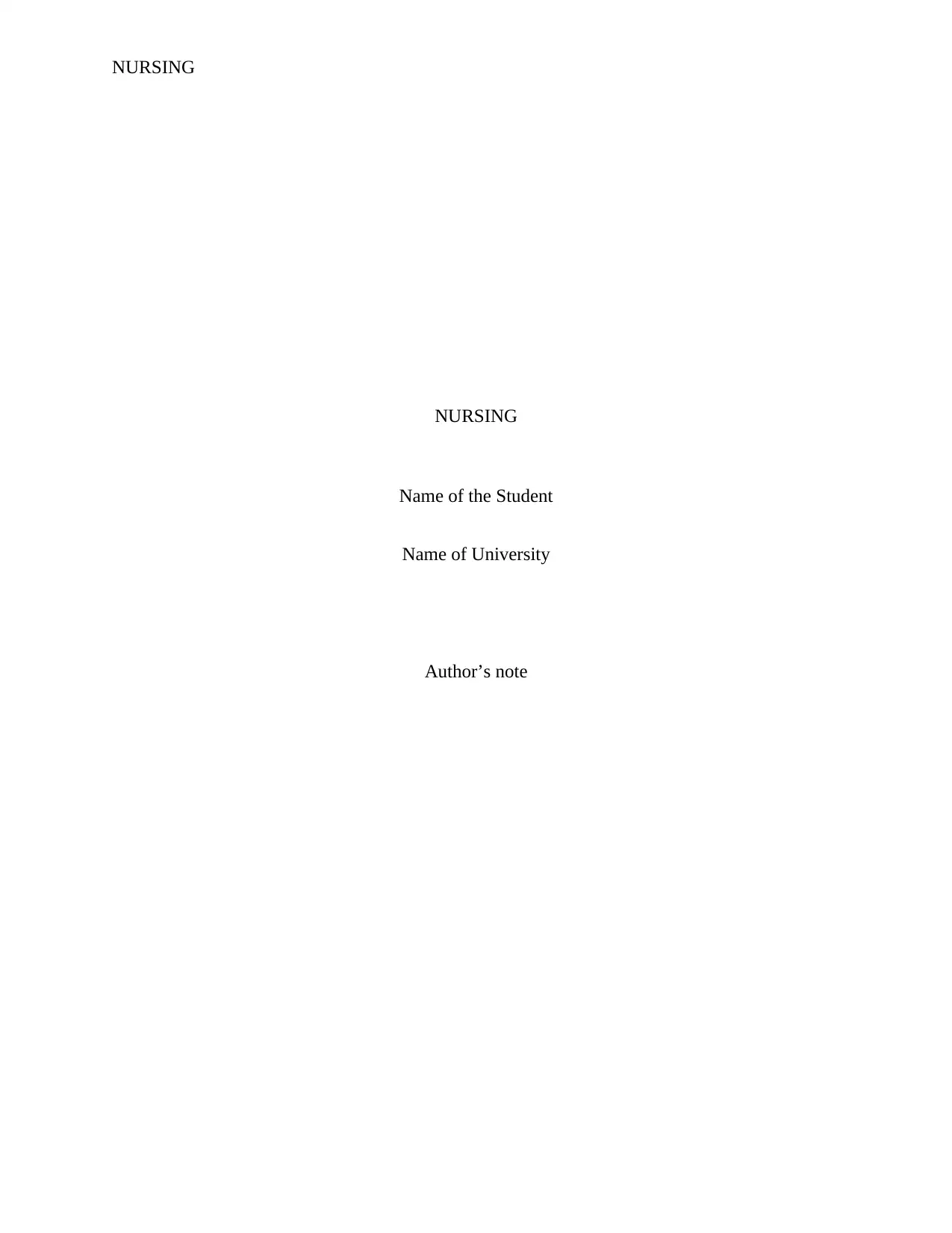
NURSING
NURSING
Name of the Student
Name of University
Author’s note
NURSING
Name of the Student
Name of University
Author’s note
Paraphrase This Document
Need a fresh take? Get an instant paraphrase of this document with our AI Paraphraser
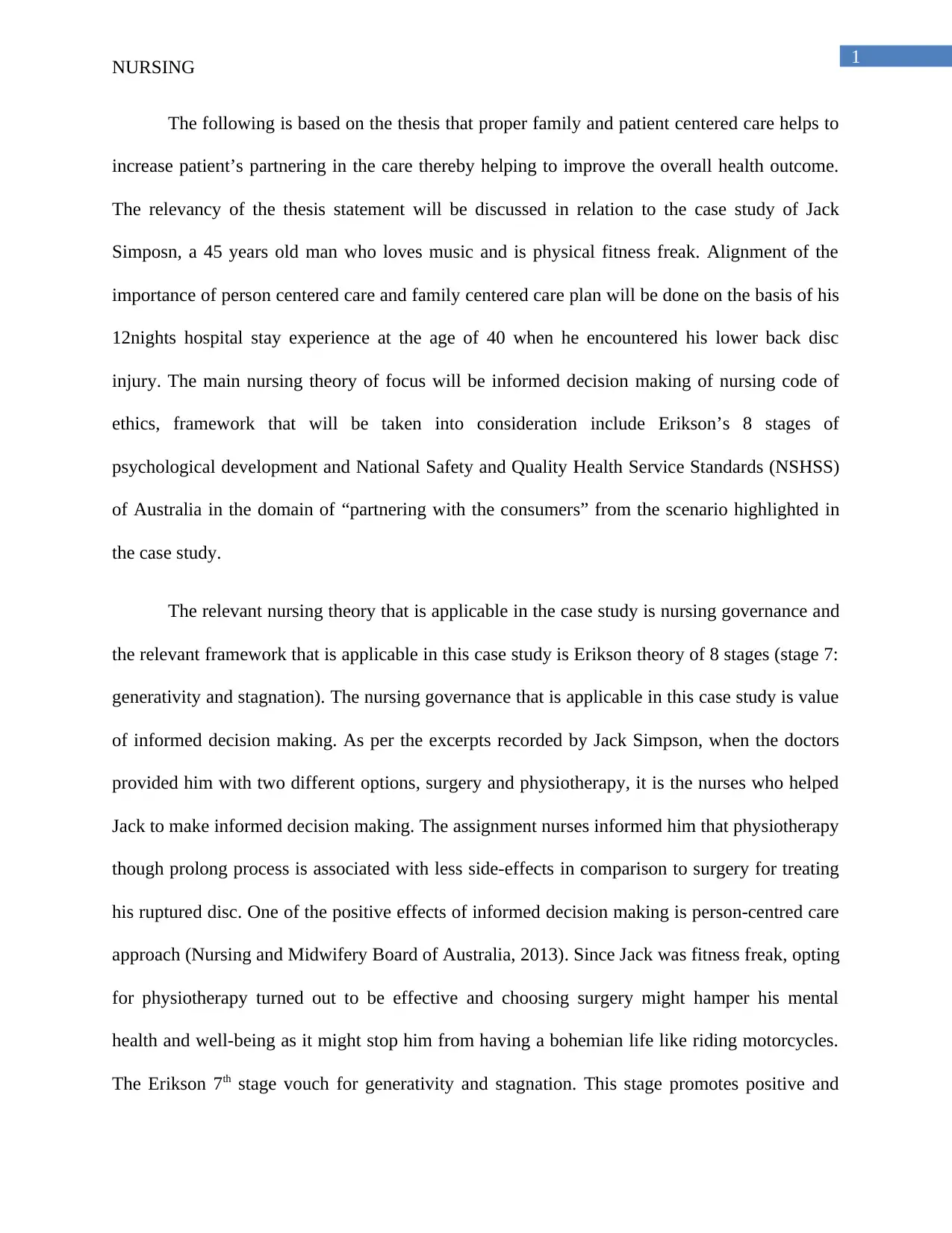
1
NURSING
The following is based on the thesis that proper family and patient centered care helps to
increase patient’s partnering in the care thereby helping to improve the overall health outcome.
The relevancy of the thesis statement will be discussed in relation to the case study of Jack
Simposn, a 45 years old man who loves music and is physical fitness freak. Alignment of the
importance of person centered care and family centered care plan will be done on the basis of his
12nights hospital stay experience at the age of 40 when he encountered his lower back disc
injury. The main nursing theory of focus will be informed decision making of nursing code of
ethics, framework that will be taken into consideration include Erikson’s 8 stages of
psychological development and National Safety and Quality Health Service Standards (NSHSS)
of Australia in the domain of “partnering with the consumers” from the scenario highlighted in
the case study.
The relevant nursing theory that is applicable in the case study is nursing governance and
the relevant framework that is applicable in this case study is Erikson theory of 8 stages (stage 7:
generativity and stagnation). The nursing governance that is applicable in this case study is value
of informed decision making. As per the excerpts recorded by Jack Simpson, when the doctors
provided him with two different options, surgery and physiotherapy, it is the nurses who helped
Jack to make informed decision making. The assignment nurses informed him that physiotherapy
though prolong process is associated with less side-effects in comparison to surgery for treating
his ruptured disc. One of the positive effects of informed decision making is person-centred care
approach (Nursing and Midwifery Board of Australia, 2013). Since Jack was fitness freak, opting
for physiotherapy turned out to be effective and choosing surgery might hamper his mental
health and well-being as it might stop him from having a bohemian life like riding motorcycles.
The Erikson 7th stage vouch for generativity and stagnation. This stage promotes positive and
NURSING
The following is based on the thesis that proper family and patient centered care helps to
increase patient’s partnering in the care thereby helping to improve the overall health outcome.
The relevancy of the thesis statement will be discussed in relation to the case study of Jack
Simposn, a 45 years old man who loves music and is physical fitness freak. Alignment of the
importance of person centered care and family centered care plan will be done on the basis of his
12nights hospital stay experience at the age of 40 when he encountered his lower back disc
injury. The main nursing theory of focus will be informed decision making of nursing code of
ethics, framework that will be taken into consideration include Erikson’s 8 stages of
psychological development and National Safety and Quality Health Service Standards (NSHSS)
of Australia in the domain of “partnering with the consumers” from the scenario highlighted in
the case study.
The relevant nursing theory that is applicable in the case study is nursing governance and
the relevant framework that is applicable in this case study is Erikson theory of 8 stages (stage 7:
generativity and stagnation). The nursing governance that is applicable in this case study is value
of informed decision making. As per the excerpts recorded by Jack Simpson, when the doctors
provided him with two different options, surgery and physiotherapy, it is the nurses who helped
Jack to make informed decision making. The assignment nurses informed him that physiotherapy
though prolong process is associated with less side-effects in comparison to surgery for treating
his ruptured disc. One of the positive effects of informed decision making is person-centred care
approach (Nursing and Midwifery Board of Australia, 2013). Since Jack was fitness freak, opting
for physiotherapy turned out to be effective and choosing surgery might hamper his mental
health and well-being as it might stop him from having a bohemian life like riding motorcycles.
The Erikson 7th stage vouch for generativity and stagnation. This stage promotes positive and
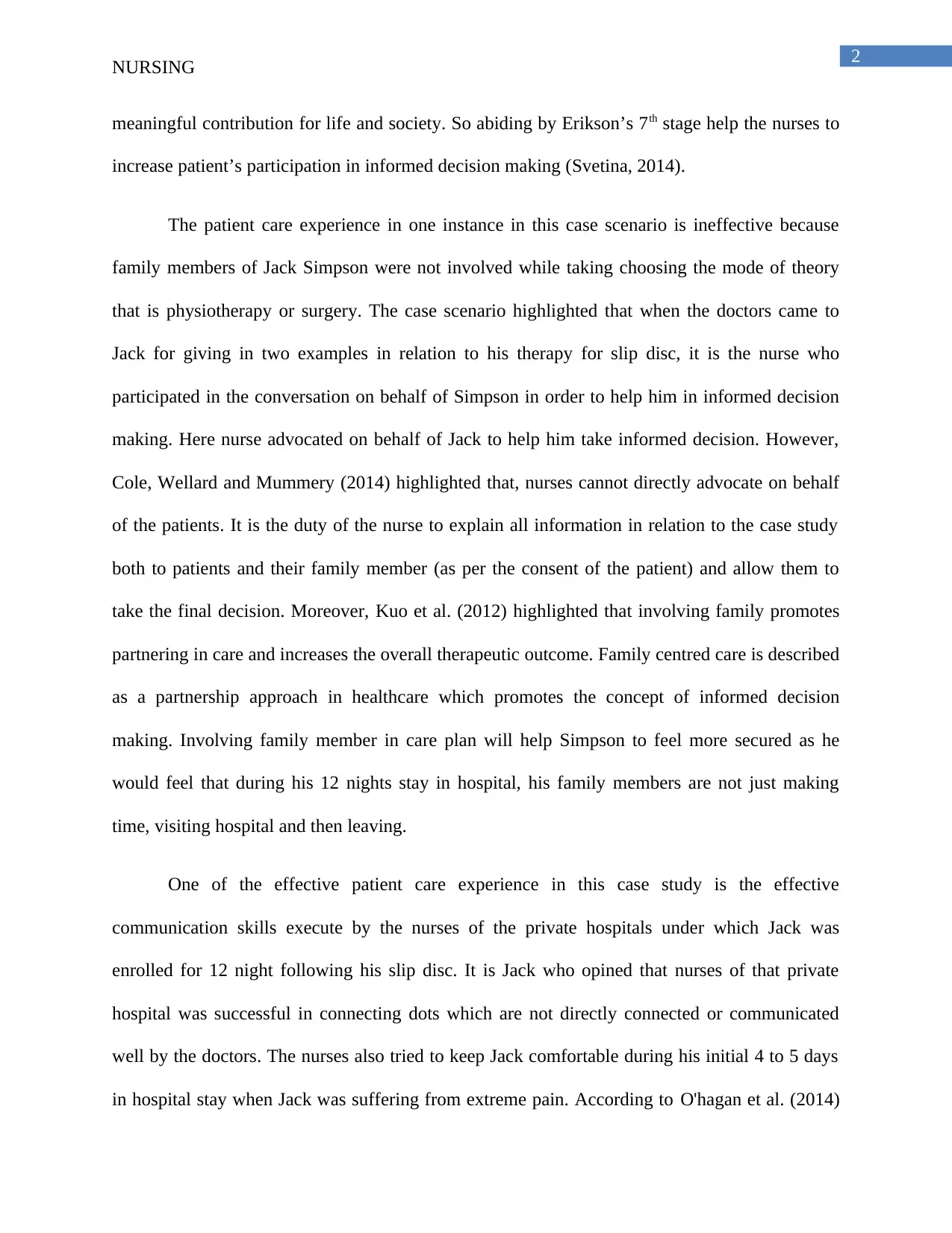
2
NURSING
meaningful contribution for life and society. So abiding by Erikson’s 7th stage help the nurses to
increase patient’s participation in informed decision making (Svetina, 2014).
The patient care experience in one instance in this case scenario is ineffective because
family members of Jack Simpson were not involved while taking choosing the mode of theory
that is physiotherapy or surgery. The case scenario highlighted that when the doctors came to
Jack for giving in two examples in relation to his therapy for slip disc, it is the nurse who
participated in the conversation on behalf of Simpson in order to help him in informed decision
making. Here nurse advocated on behalf of Jack to help him take informed decision. However,
Cole, Wellard and Mummery (2014) highlighted that, nurses cannot directly advocate on behalf
of the patients. It is the duty of the nurse to explain all information in relation to the case study
both to patients and their family member (as per the consent of the patient) and allow them to
take the final decision. Moreover, Kuo et al. (2012) highlighted that involving family promotes
partnering in care and increases the overall therapeutic outcome. Family centred care is described
as a partnership approach in healthcare which promotes the concept of informed decision
making. Involving family member in care plan will help Simpson to feel more secured as he
would feel that during his 12 nights stay in hospital, his family members are not just making
time, visiting hospital and then leaving.
One of the effective patient care experience in this case study is the effective
communication skills execute by the nurses of the private hospitals under which Jack was
enrolled for 12 night following his slip disc. It is Jack who opined that nurses of that private
hospital was successful in connecting dots which are not directly connected or communicated
well by the doctors. The nurses also tried to keep Jack comfortable during his initial 4 to 5 days
in hospital stay when Jack was suffering from extreme pain. According to O'hagan et al. (2014)
NURSING
meaningful contribution for life and society. So abiding by Erikson’s 7th stage help the nurses to
increase patient’s participation in informed decision making (Svetina, 2014).
The patient care experience in one instance in this case scenario is ineffective because
family members of Jack Simpson were not involved while taking choosing the mode of theory
that is physiotherapy or surgery. The case scenario highlighted that when the doctors came to
Jack for giving in two examples in relation to his therapy for slip disc, it is the nurse who
participated in the conversation on behalf of Simpson in order to help him in informed decision
making. Here nurse advocated on behalf of Jack to help him take informed decision. However,
Cole, Wellard and Mummery (2014) highlighted that, nurses cannot directly advocate on behalf
of the patients. It is the duty of the nurse to explain all information in relation to the case study
both to patients and their family member (as per the consent of the patient) and allow them to
take the final decision. Moreover, Kuo et al. (2012) highlighted that involving family promotes
partnering in care and increases the overall therapeutic outcome. Family centred care is described
as a partnership approach in healthcare which promotes the concept of informed decision
making. Involving family member in care plan will help Simpson to feel more secured as he
would feel that during his 12 nights stay in hospital, his family members are not just making
time, visiting hospital and then leaving.
One of the effective patient care experience in this case study is the effective
communication skills execute by the nurses of the private hospitals under which Jack was
enrolled for 12 night following his slip disc. It is Jack who opined that nurses of that private
hospital was successful in connecting dots which are not directly connected or communicated
well by the doctors. The nurses also tried to keep Jack comfortable during his initial 4 to 5 days
in hospital stay when Jack was suffering from extreme pain. According to O'hagan et al. (2014)
⊘ This is a preview!⊘
Do you want full access?
Subscribe today to unlock all pages.

Trusted by 1+ million students worldwide
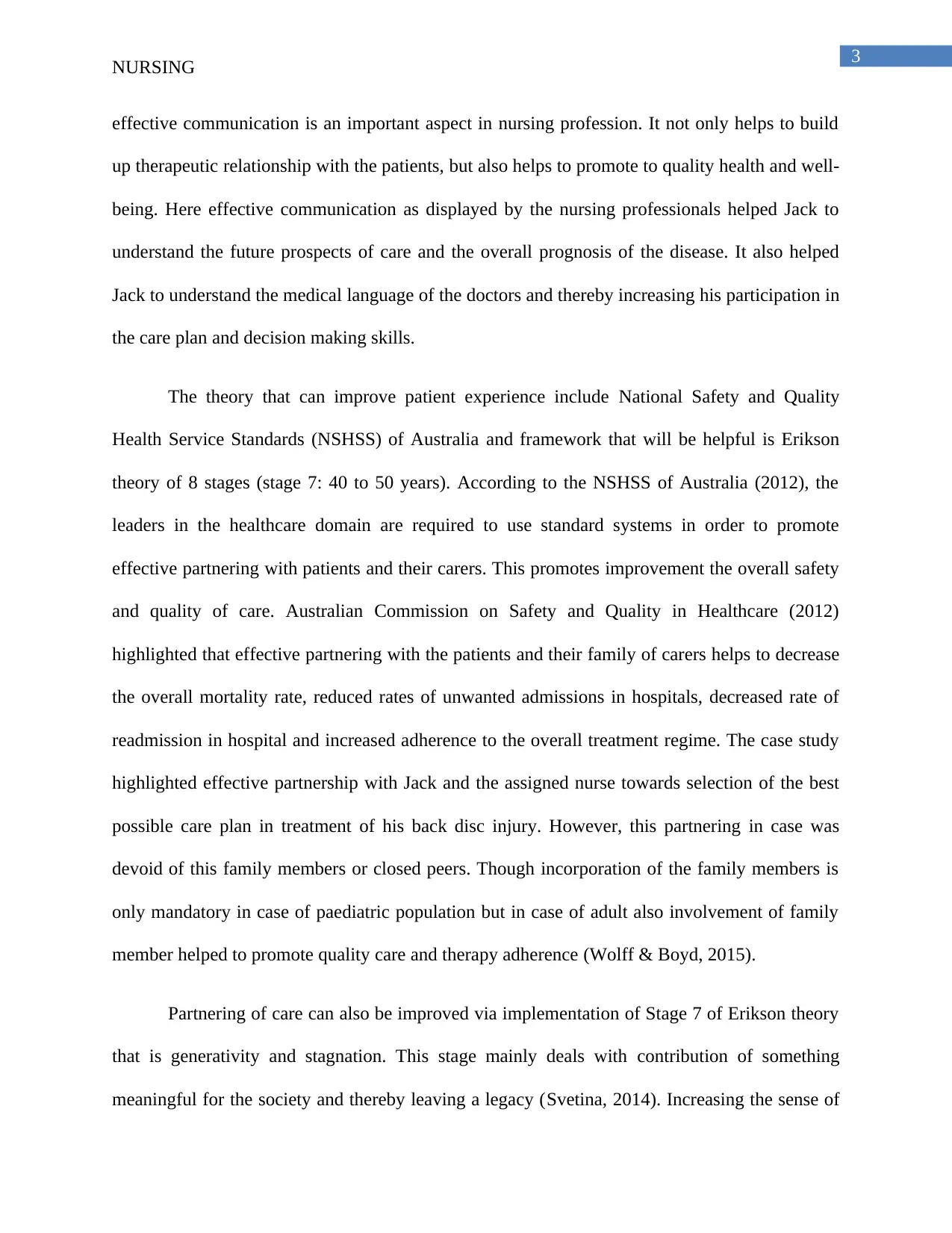
3
NURSING
effective communication is an important aspect in nursing profession. It not only helps to build
up therapeutic relationship with the patients, but also helps to promote to quality health and well-
being. Here effective communication as displayed by the nursing professionals helped Jack to
understand the future prospects of care and the overall prognosis of the disease. It also helped
Jack to understand the medical language of the doctors and thereby increasing his participation in
the care plan and decision making skills.
The theory that can improve patient experience include National Safety and Quality
Health Service Standards (NSHSS) of Australia and framework that will be helpful is Erikson
theory of 8 stages (stage 7: 40 to 50 years). According to the NSHSS of Australia (2012), the
leaders in the healthcare domain are required to use standard systems in order to promote
effective partnering with patients and their carers. This promotes improvement the overall safety
and quality of care. Australian Commission on Safety and Quality in Healthcare (2012)
highlighted that effective partnering with the patients and their family of carers helps to decrease
the overall mortality rate, reduced rates of unwanted admissions in hospitals, decreased rate of
readmission in hospital and increased adherence to the overall treatment regime. The case study
highlighted effective partnership with Jack and the assigned nurse towards selection of the best
possible care plan in treatment of his back disc injury. However, this partnering in case was
devoid of this family members or closed peers. Though incorporation of the family members is
only mandatory in case of paediatric population but in case of adult also involvement of family
member helped to promote quality care and therapy adherence (Wolff & Boyd, 2015).
Partnering of care can also be improved via implementation of Stage 7 of Erikson theory
that is generativity and stagnation. This stage mainly deals with contribution of something
meaningful for the society and thereby leaving a legacy (Svetina, 2014). Increasing the sense of
NURSING
effective communication is an important aspect in nursing profession. It not only helps to build
up therapeutic relationship with the patients, but also helps to promote to quality health and well-
being. Here effective communication as displayed by the nursing professionals helped Jack to
understand the future prospects of care and the overall prognosis of the disease. It also helped
Jack to understand the medical language of the doctors and thereby increasing his participation in
the care plan and decision making skills.
The theory that can improve patient experience include National Safety and Quality
Health Service Standards (NSHSS) of Australia and framework that will be helpful is Erikson
theory of 8 stages (stage 7: 40 to 50 years). According to the NSHSS of Australia (2012), the
leaders in the healthcare domain are required to use standard systems in order to promote
effective partnering with patients and their carers. This promotes improvement the overall safety
and quality of care. Australian Commission on Safety and Quality in Healthcare (2012)
highlighted that effective partnering with the patients and their family of carers helps to decrease
the overall mortality rate, reduced rates of unwanted admissions in hospitals, decreased rate of
readmission in hospital and increased adherence to the overall treatment regime. The case study
highlighted effective partnership with Jack and the assigned nurse towards selection of the best
possible care plan in treatment of his back disc injury. However, this partnering in case was
devoid of this family members or closed peers. Though incorporation of the family members is
only mandatory in case of paediatric population but in case of adult also involvement of family
member helped to promote quality care and therapy adherence (Wolff & Boyd, 2015).
Partnering of care can also be improved via implementation of Stage 7 of Erikson theory
that is generativity and stagnation. This stage mainly deals with contribution of something
meaningful for the society and thereby leaving a legacy (Svetina, 2014). Increasing the sense of
Paraphrase This Document
Need a fresh take? Get an instant paraphrase of this document with our AI Paraphraser
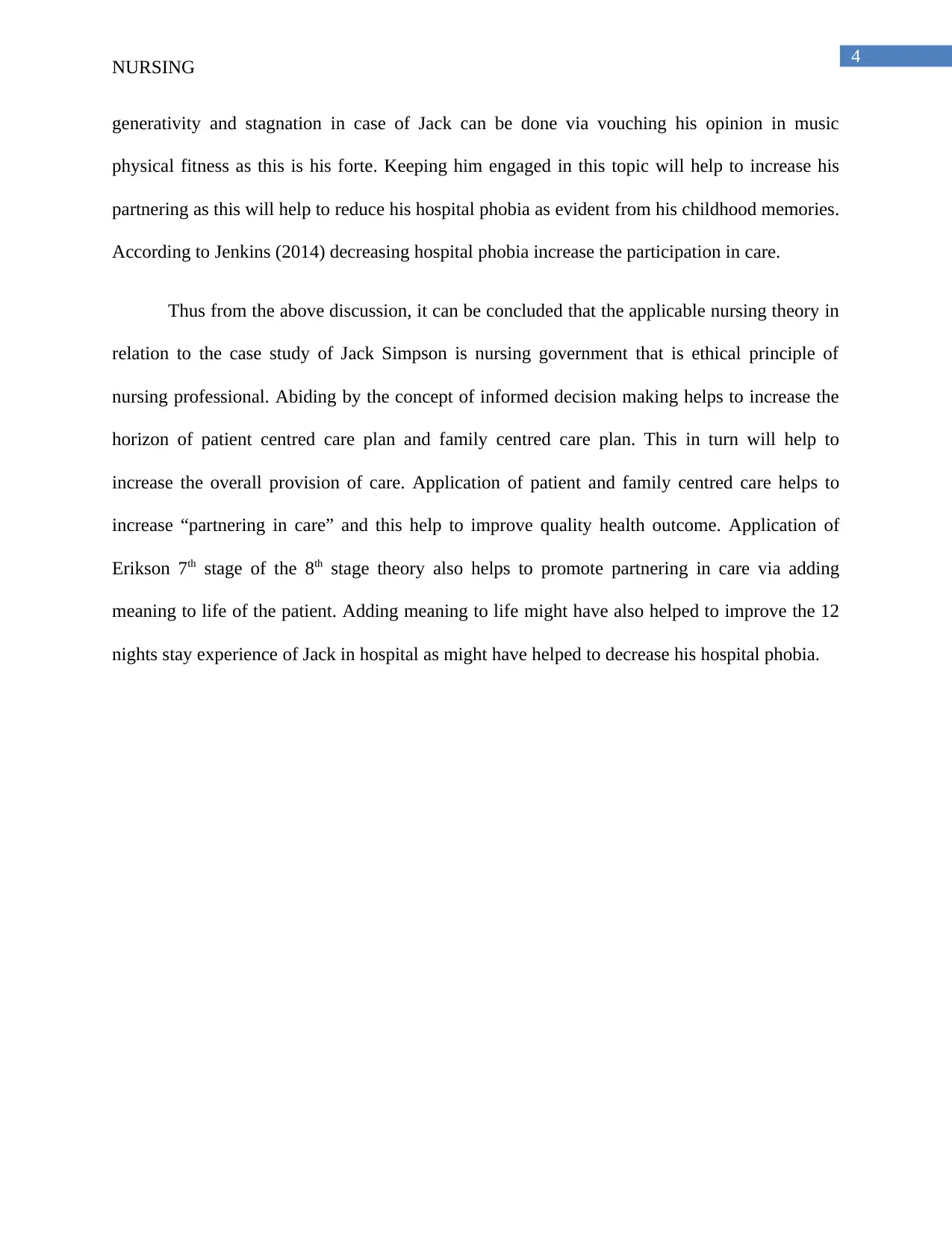
4
NURSING
generativity and stagnation in case of Jack can be done via vouching his opinion in music
physical fitness as this is his forte. Keeping him engaged in this topic will help to increase his
partnering as this will help to reduce his hospital phobia as evident from his childhood memories.
According to Jenkins (2014) decreasing hospital phobia increase the participation in care.
Thus from the above discussion, it can be concluded that the applicable nursing theory in
relation to the case study of Jack Simpson is nursing government that is ethical principle of
nursing professional. Abiding by the concept of informed decision making helps to increase the
horizon of patient centred care plan and family centred care plan. This in turn will help to
increase the overall provision of care. Application of patient and family centred care helps to
increase “partnering in care” and this help to improve quality health outcome. Application of
Erikson 7th stage of the 8th stage theory also helps to promote partnering in care via adding
meaning to life of the patient. Adding meaning to life might have also helped to improve the 12
nights stay experience of Jack in hospital as might have helped to decrease his hospital phobia.
NURSING
generativity and stagnation in case of Jack can be done via vouching his opinion in music
physical fitness as this is his forte. Keeping him engaged in this topic will help to increase his
partnering as this will help to reduce his hospital phobia as evident from his childhood memories.
According to Jenkins (2014) decreasing hospital phobia increase the participation in care.
Thus from the above discussion, it can be concluded that the applicable nursing theory in
relation to the case study of Jack Simpson is nursing government that is ethical principle of
nursing professional. Abiding by the concept of informed decision making helps to increase the
horizon of patient centred care plan and family centred care plan. This in turn will help to
increase the overall provision of care. Application of patient and family centred care helps to
increase “partnering in care” and this help to improve quality health outcome. Application of
Erikson 7th stage of the 8th stage theory also helps to promote partnering in care via adding
meaning to life of the patient. Adding meaning to life might have also helped to improve the 12
nights stay experience of Jack in hospital as might have helped to decrease his hospital phobia.
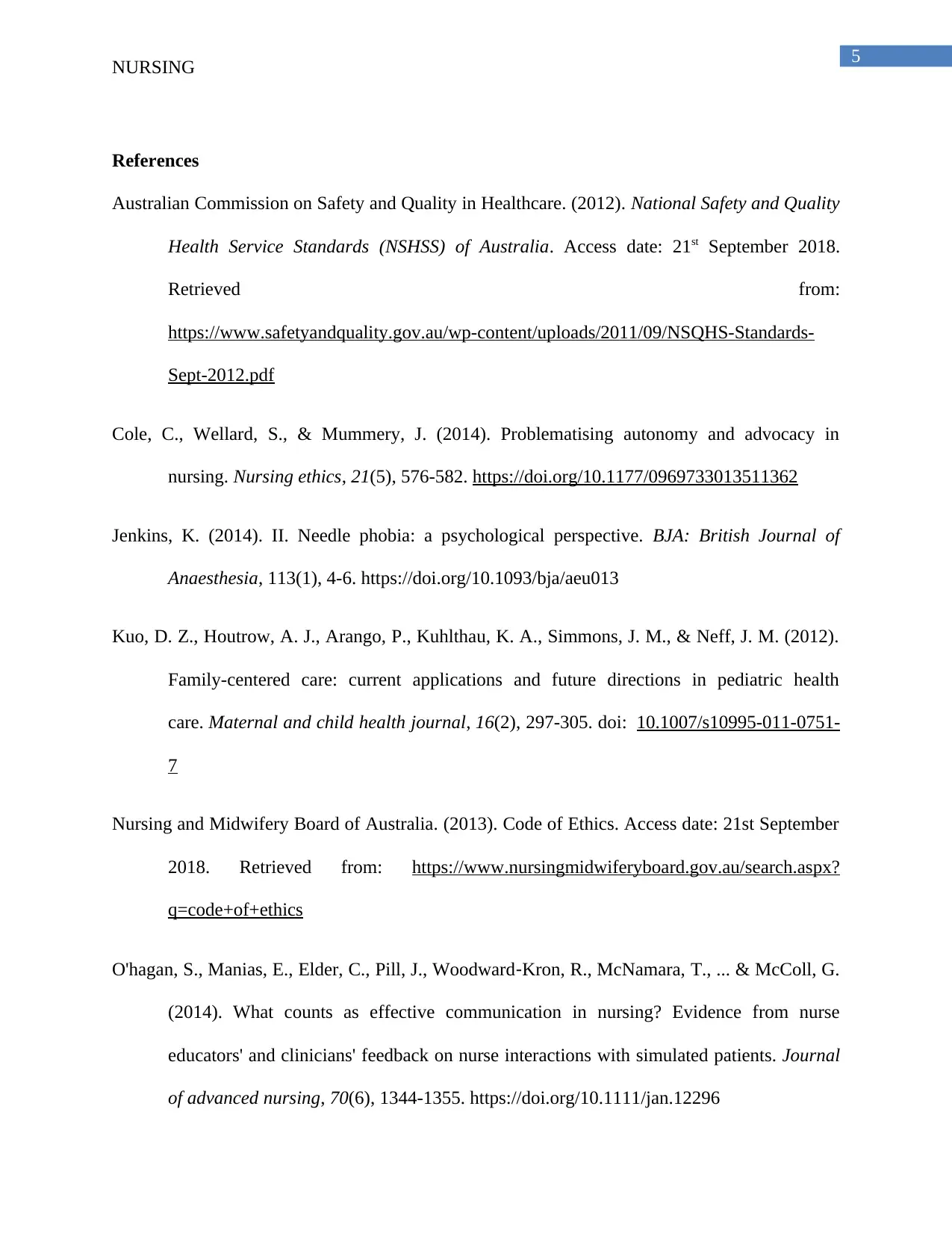
5
NURSING
References
Australian Commission on Safety and Quality in Healthcare. (2012). National Safety and Quality
Health Service Standards (NSHSS) of Australia. Access date: 21st September 2018.
Retrieved from:
https://www.safetyandquality.gov.au/wp-content/uploads/2011/09/NSQHS-Standards-
Sept-2012.pdf
Cole, C., Wellard, S., & Mummery, J. (2014). Problematising autonomy and advocacy in
nursing. Nursing ethics, 21(5), 576-582. https://doi.org/10.1177/0969733013511362
Jenkins, K. (2014). II. Needle phobia: a psychological perspective. BJA: British Journal of
Anaesthesia, 113(1), 4-6. https://doi.org/10.1093/bja/aeu013
Kuo, D. Z., Houtrow, A. J., Arango, P., Kuhlthau, K. A., Simmons, J. M., & Neff, J. M. (2012).
Family-centered care: current applications and future directions in pediatric health
care. Maternal and child health journal, 16(2), 297-305. doi: 10.1007/s10995-011-0751-
7
Nursing and Midwifery Board of Australia. (2013). Code of Ethics. Access date: 21st September
2018. Retrieved from: https://www.nursingmidwiferyboard.gov.au/search.aspx?
q=code+of+ethics
O'hagan, S., Manias, E., Elder, C., Pill, J., Woodward‐Kron, R., McNamara, T., ... & McColl, G.
(2014). What counts as effective communication in nursing? Evidence from nurse
educators' and clinicians' feedback on nurse interactions with simulated patients. Journal
of advanced nursing, 70(6), 1344-1355. https://doi.org/10.1111/jan.12296
NURSING
References
Australian Commission on Safety and Quality in Healthcare. (2012). National Safety and Quality
Health Service Standards (NSHSS) of Australia. Access date: 21st September 2018.
Retrieved from:
https://www.safetyandquality.gov.au/wp-content/uploads/2011/09/NSQHS-Standards-
Sept-2012.pdf
Cole, C., Wellard, S., & Mummery, J. (2014). Problematising autonomy and advocacy in
nursing. Nursing ethics, 21(5), 576-582. https://doi.org/10.1177/0969733013511362
Jenkins, K. (2014). II. Needle phobia: a psychological perspective. BJA: British Journal of
Anaesthesia, 113(1), 4-6. https://doi.org/10.1093/bja/aeu013
Kuo, D. Z., Houtrow, A. J., Arango, P., Kuhlthau, K. A., Simmons, J. M., & Neff, J. M. (2012).
Family-centered care: current applications and future directions in pediatric health
care. Maternal and child health journal, 16(2), 297-305. doi: 10.1007/s10995-011-0751-
7
Nursing and Midwifery Board of Australia. (2013). Code of Ethics. Access date: 21st September
2018. Retrieved from: https://www.nursingmidwiferyboard.gov.au/search.aspx?
q=code+of+ethics
O'hagan, S., Manias, E., Elder, C., Pill, J., Woodward‐Kron, R., McNamara, T., ... & McColl, G.
(2014). What counts as effective communication in nursing? Evidence from nurse
educators' and clinicians' feedback on nurse interactions with simulated patients. Journal
of advanced nursing, 70(6), 1344-1355. https://doi.org/10.1111/jan.12296
⊘ This is a preview!⊘
Do you want full access?
Subscribe today to unlock all pages.

Trusted by 1+ million students worldwide
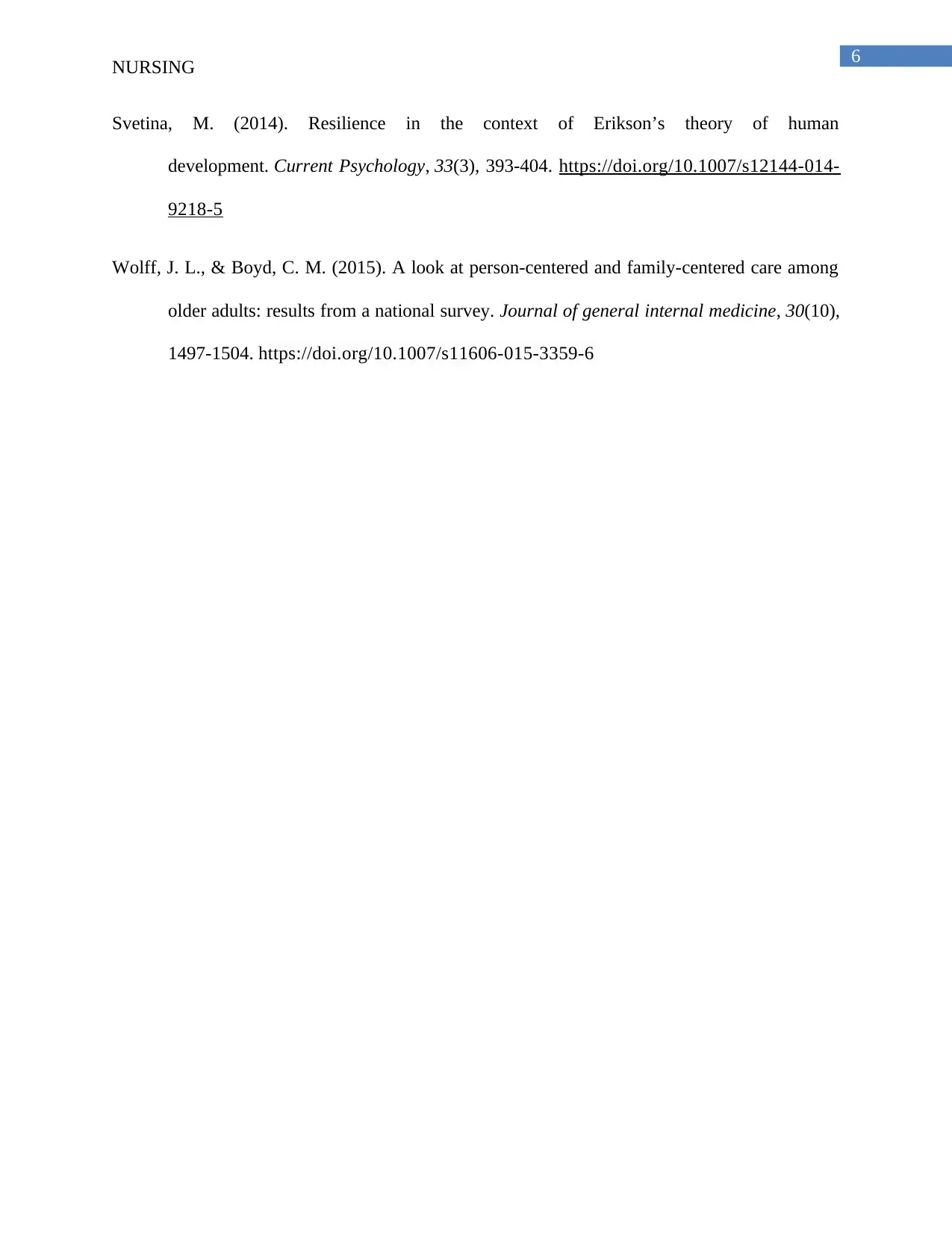
6
NURSING
Svetina, M. (2014). Resilience in the context of Erikson’s theory of human
development. Current Psychology, 33(3), 393-404. https://doi.org/10.1007/s12144-014-
9218-5
Wolff, J. L., & Boyd, C. M. (2015). A look at person-centered and family-centered care among
older adults: results from a national survey. Journal of general internal medicine, 30(10),
1497-1504. https://doi.org/10.1007/s11606-015-3359-6
NURSING
Svetina, M. (2014). Resilience in the context of Erikson’s theory of human
development. Current Psychology, 33(3), 393-404. https://doi.org/10.1007/s12144-014-
9218-5
Wolff, J. L., & Boyd, C. M. (2015). A look at person-centered and family-centered care among
older adults: results from a national survey. Journal of general internal medicine, 30(10),
1497-1504. https://doi.org/10.1007/s11606-015-3359-6
1 out of 7
Related Documents
Your All-in-One AI-Powered Toolkit for Academic Success.
+13062052269
info@desklib.com
Available 24*7 on WhatsApp / Email
![[object Object]](/_next/static/media/star-bottom.7253800d.svg)
Unlock your academic potential
Copyright © 2020–2026 A2Z Services. All Rights Reserved. Developed and managed by ZUCOL.




